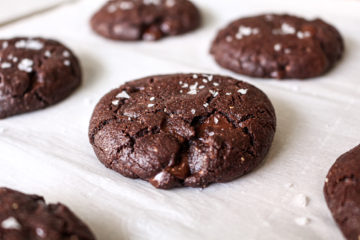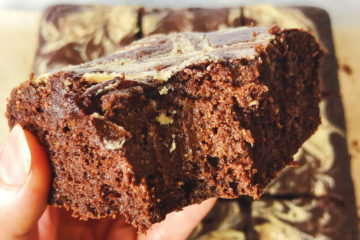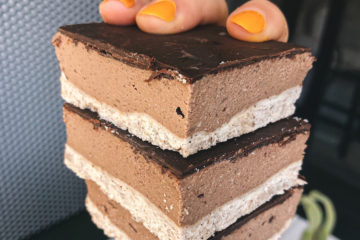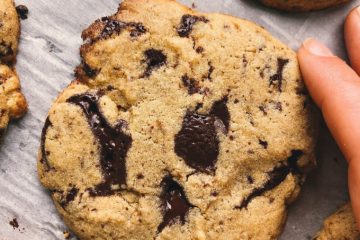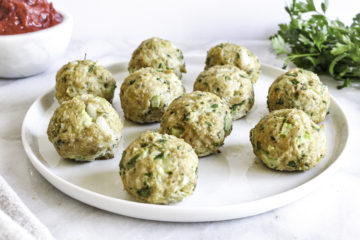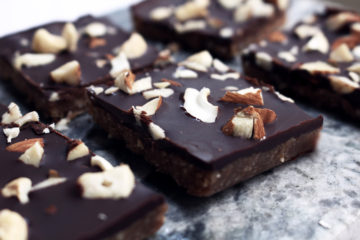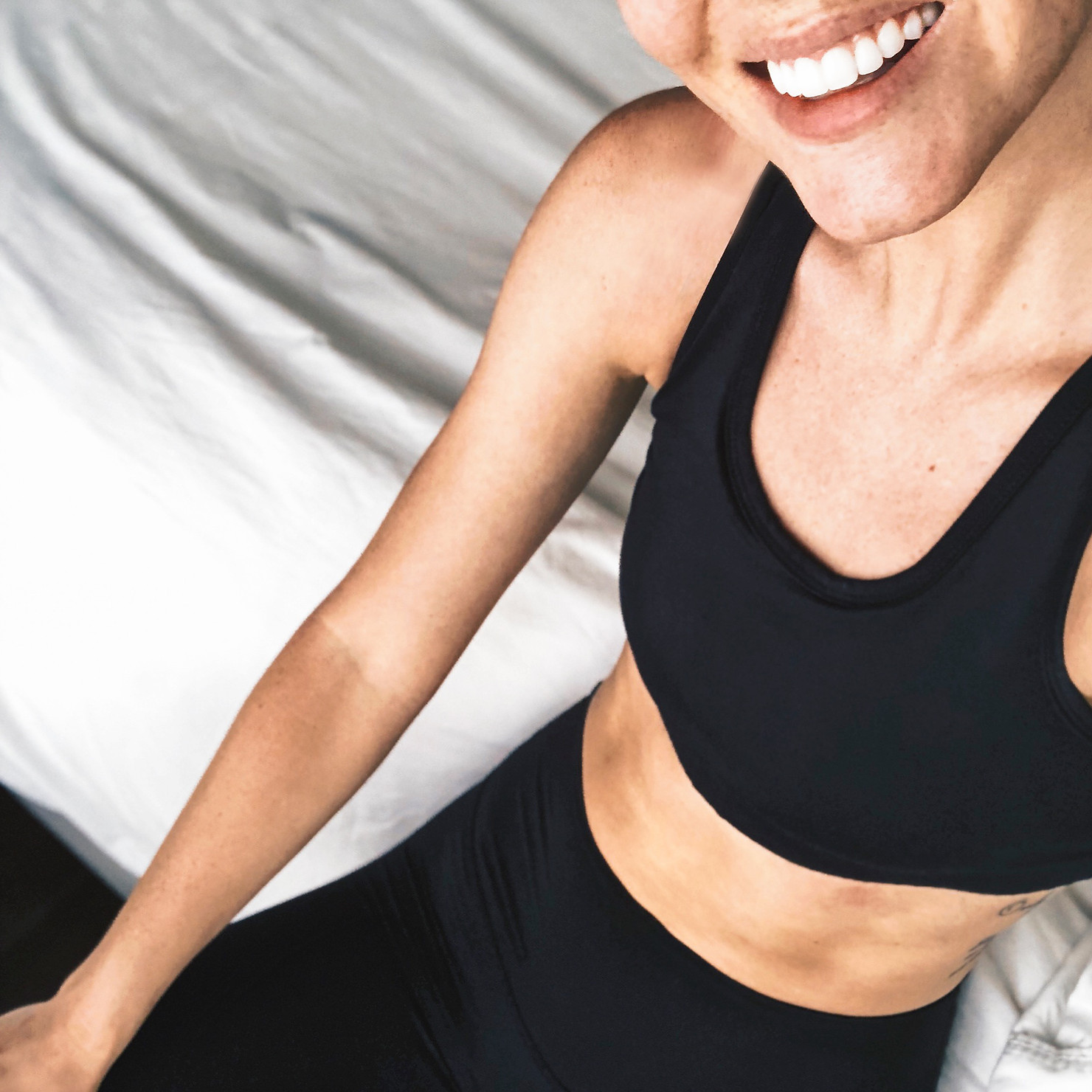
5 ways to a flatter stomach was written for all the gals out there who have been in the following situation at one point in their life.
It’s Sunday afternoon, it’s 100° out, it’s summer in Los Angeles. You’re about to head to your friends pool party in Venice, but the girls brunch you just left caused your stomach to blow up to the size of your nieces beach ball. Panic ensues, the search for an anti bloat insta filter begins, and short of fibbing to your friends that you’re 6 months pregnant, you’re effed.
Don’t panic, Peanut’s gotchu. These 5 ways to a flatter stomach will prevent a fast exit from your next pool party.
1. Hydration, Hydration, Hydration
Getting in your 8+ glasses of water isn’t just touted for glowing skin. It also can help keep our meals flowing smoothly through the colon and out the other end. Dehydration can happen pretty easily and is a direct contributor to constipation. Constipation occurs when the stool in your colon gets dehydrated. Water is withdrawn from the large intestine to hydrate the body. When there is too little water available, the stool becomes dry, hard and difficult to move through the colon.
Did you know?
Our bodies lose 1lb of water when we sleep, so before you reach for your morning cup of cold brew (super dehydrating bro) start your day off right with some H2O. Bonus flow if you squeeze in lemon. It’s great to keep a large 32oz jar of water next to my bed and drink the whole thing upon waking. So if you ever feel like you’re retaining fluid, it probably means it’s time to drink some more water.
Pro-tip, avoid carbonated drinks like that all too tempting Grapefruit La Croix, these will likely make you more bloated and gassy. Instead, reach for herbal tea or a good old glass of room temp water.
2. Eat what’s right for your Gut
Ever wonder why your boyfriend can handle eating all the fruit in the world, but you have half an apple and you’re bloated af? You’re not alone. I was experiencing the exact same thing until I found out that certain healthy foods weren’t working for my individual gut.
Following along my health journey you’d know I recently switched from a vegan diet to a more flexible style of eating.
But why?
Short answer, my gut couldn’t handle the beans, grains, legumes, and starchy vegetables all part of the Vegan diet. That doesn’t mean to say my neighbor couldn’t thrive on these foods so chill, we’re all different. My individual microbiome does better with a predominantly protein and fat based diet, as opposed to the carb heavy diet that naturally came with being Vegan.
I found all this out from Viome – an at home gut intelligence test that analyzes your poop and gives you a diet plan to reach optimal gut health based off your individual results. Their latest update includes 300 plus foods, your personalized recommended servings for each category of food (mine is 5 servings of veg per day whereas my husbands is 9), and a guideline of how many foods should come from your indulge and superfood list, your enjoy list and even your minimize list.
I can’t stress enough how much this has changed the way I look at food. No more second guessing which vegetables should go on my plate or if ill get bloated right after. I have been following these guidelines for the past 6 months and have seen such an improvement in the health of my gut. A huge milestone for me was that I used to be hugely intolerant to garlic in all forms, and i’m now at a stage where I can tolerate it!
Click here to read more on my experience with Viome.
Or if you’d like to get your own kit use this link to get a discount off your own test https://www.viome.com/?refcode=PEANUTHEAD20

3. Managing Stress
Both physical and emotional stress can play a huge part in hindering your efforts to get a flat tummy. (Or even shed those extra 5lbs)
Exercise is a form of physical stress. Whereas, a bad breakup, losing your job or money issues are forms of emotional stress. It may seem counter-intuitive but too much exercise could actually make you gain weight in the long run. If you’re a gym junky flogging yourself in the cardio department every day but not seeing results, chances are you’re putting your body under more stress than it can handle. One major effect that extreme exercise has on our bodies is an immediate increase in cortisol, the hormone that is released when the body is under stress, also known as ‘fight or flight’ mode.
When you’re stressed out, your body wants to defend itself, so it starts to retain body weight. Basically, even if you’re exercising regularly and eating well you can still gain weight (evil, I know) because your body is trying to ward off an unseen threat. It’s usually with chronic stress that you’ll see this.
Here’s an example
Pushing yourself on the treadmill in the morning, eating breakfast in your car while being stressed out by traffic, then coming home and having a fight with your boyfriend. This kind of day is a recipe for chronic stress and can impact you in more ways than craving a pint of ice-cream after dinner to make your day a little better.
Elevated levels of cortisol can also seriously impair your ability to absorb vital vitamins and minerals from your food. This is because cortisol tells your body to stop producing the enzymes it needs for digestion. It makes sense when you understand that in full on fight or flight mode, eating is not a top priority. Them making matters words by the fact that high cortisol levels increase your appetite, making you reach for sweet, high calorie foods. This is one of the major reasons why high cortisol levels can lead to excess weight gain and belly fat.
Here are some commonly reported symptoms caused by high cortisol:
- Rapid weight gain
- High blood pressure
- Muscle weakness
- Mood swings, anxiety, and depression
- Foggy Brain
- Impaired thyroid function
- Blood sugar imbalances
- Poor sleep
- Lowered immunity
- Slow wound healing
Ways to manage your stress
- Meditate
- Partake in low impact exercise (walks, light weights, yoga, LISS)
- Eat food away from the TV and screens
- Get adequate nutrition
- Get more sunlight
- Cut back on the coffee
4. Managing your Hormones
This is linked to the above point as the delicate balance of our hormones can contribute to our tendency to bloat. And I’m sorry to say ladies, the odds aren’t in our favor here.
Your bloating could be linked to estrogen, progesterone or your thyroid hormones not functioning at their best. During the menstrual cycle, there is a fluctuation of estrogen which causes fluid retention and bloating. It is not unusual for women to gain a few pounds during their cycle due to estrogens ability to retain fluid.
There is also such a thing as estrogen dominance. This happens when you produce too much estrogen for your body to metabolize, and therefore appearing via the below potential symptoms.
- Bloating
- Swelling and tenderness in your breasts
- Fibrocystic lumps in your breasts
- Decreased sex drive
- Irregular menstrual periods
- Increased symptoms of premenstrual syndrome (PMS)
- Mood swings
- Headaches
- Anxiety and panic attacks
- Weight gain
- Hair loss
- Cold hands or feet
- Trouble sleeping
- Sleepiness or fatigue
The following factors can also contribute to a disruption in your hormones.
- Using a contraceptive pill
- Eating meat & dairy that has been factory farmed (ie. contain hormones)
- Unstable blood sugar – i.e. skipping meals, drinking coffee first thing in the morning, eating sugary foods.
- Using products that disrupt the endocrine system (See below)
Products around the home you should investigate (information cited from Women Code by Alisa Vitti)
- Nail Polish Body Lotion & Deodorant – Remove if the label lists: chemicals from the phthalate family (DBP, DEHP)
- Toothpaste, Shampoo, Cleaning products, Bath Salts & shower gel – Remove if the label lists: sodium laurel sulfate (SLS) or sodium laurel ether sulfate (SLES), Ammonium Laurel Sulfate (ALS)
- Conditioner, Foundation, Concealer, Facial Mask, Skin cream – Remove if the label lists: chemicals known as parabens (including methyl, propyl, butyl, and ethyl)
- Soap, hairspray, eyeliner, talc, shaving cream, and hair spray – Remove if the label lists: Chemicals from the anolamine family (DEA, TEA, MEA)
- Petroleum Jelly and Skin and Lip products – Remove if the label lists: petroleum
- Perfumes – Remove is the label lists: BHT, Oxybenzone, Phthalates, Octinoxate, Musk ketone
5. Getting enough shut eye
A lack of sleep effects us in more ways than just dark circles under our eyes. When we don’t get enough sleep, our bodies release that same stress hormone called cortisol, which disturbs our digestive system and causes things like bloating and constipation.
Studies have also shown that a lack of sleep increases levels of a hunger hormone called ghrelin and decreased levels of the satiety/fullness hormone called leptin, which causes you to crave all the sugar and carbs leading us to overeat and feel bloated.
If you have trouble getting good shut eye, try the following:
- Reduce the amount of caffeine you drink throughout the day
- Try to avoid heavy meals in the evening and stop eating at least 2 hours before bed
- Reduce the amount of screen time you have in the evening. The screens from our phones and computer contain blue light that disrupts our body’s natural circadian rhythm (the process in which our body knows when its time to wake up and wind down)
- Use essential oils or caffeine free herbal tea to calm the body down in the evening.
** Please note this post is to be used for informational purposes only, and is not to be used as a diagnosis for any illness.



